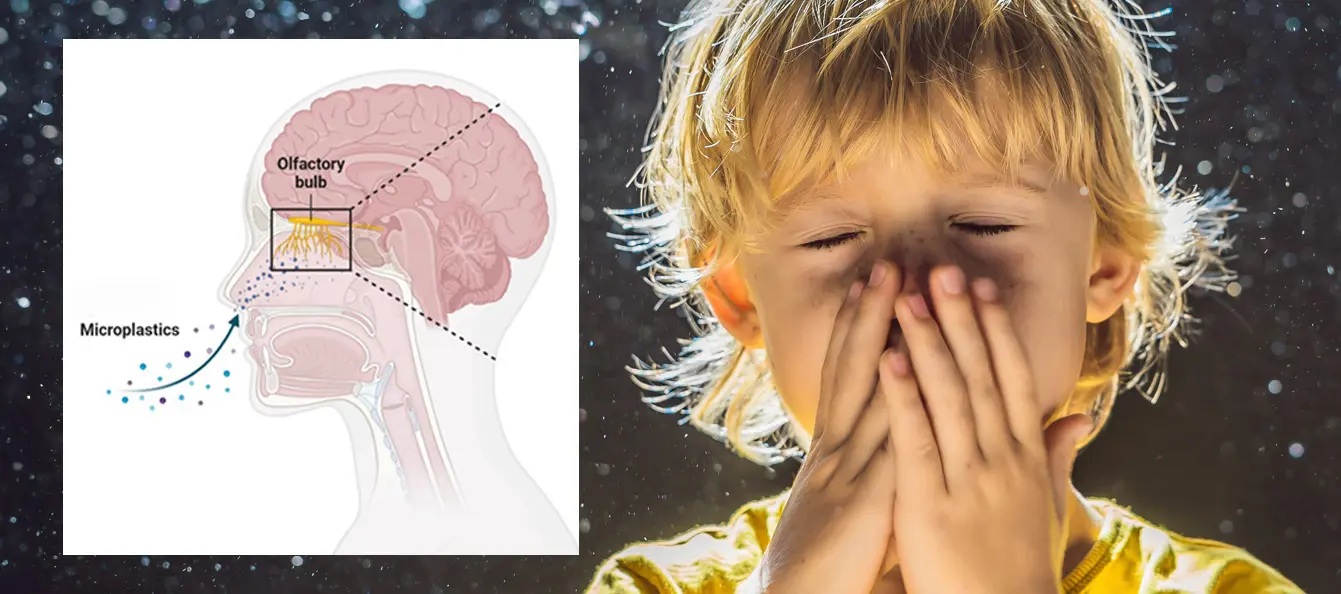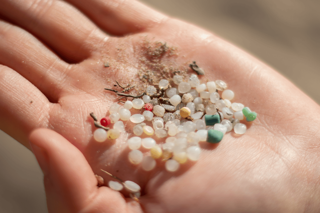A world first and a shocking discovery. Led by Professor Thais Mauad and commissioned by the Dutch NGO Plastic Soup Foundation, microplastics have been found for the first time in the bulbus olfactorius (olfactory bulb); a nerve node at the base of the brain involved in our sense of smell. This remarkable research shows that microplastics, from everyday objects, can directly enter our central nervous system.
This shocking discovery is the latest result of years of research into plastic particles in human organs. It finally shows how plastic has also invaded the body’s most complex and defensive organ: our brain.
Time is running out for effective action against plastic pollution to protect the health of current and future generations. Support our call: demand a plastics treaty that protects our health!
Microplastic contamination indoorsThe study highlights that spaces in our homes are a major source of microplastic pollution. The particles are inhaled while breathing. In total, samples were taken from the brains of 15 dead bodies. The researchers found 16 different synthetic polymer particles in eight of the 15 deceased, from commonly used items such as packaging, clothing and home accessories. The plastics present included polypropylene, nylon/polyamide, polyethylene and polyethylene vinyl acetate.
Professor Thais Mauad: “Sixteen particles may not seem like a lot, but beware, they are relatively large particles, even if you call them microplastics. This means that there are almost certainly a lot of nanoplastics in our brains that are a thousand times smaller, but can invade and change cells. This is very disturbing.”
Plastic in mouse brain
This research follows earlier findings from the University of Rhode Island in September 2023 where plastic particles were found in the brains of mice.
The researchers, led by Professor Jaime Ross, administered varying amounts of microplastics to young and old mice via drinking water for three weeks. Then they noticed all kinds of behavioral changes in the animals and changes in biomarkers in the liver and brain, which are linked to the immune system. The mice started moving and behaving strangely. The scientists linked these behaviors to dementia in humans. In the older animals, these effects were even more evident than in the young test animals. Whether this is also the case in humans needs further research to reveal.
The olfactory route as the main entry point
The identification of microplastics in both the nose and the olfactory bulb reinforces the idea that the route through the nose is a primary entry point for external particles to the brain. While this seems the most likely route of exposure, researchers are not ruling out other routes, such as through the bloodstream.
The dangers of microplastics to our health
With an annual production of more than 500 million tons of plastic (2024) for various uses, scientists have now identified more than 16,000 chemicals in plastic products, more than 4,000 of which are hazardous to humans and the environment. Extensive evidence shows that microplastics are present in the human body, including in the blood, lungs, placenta, testicles, breast milk and heart.
And now in the brain as well.
Plastic Health Council
Professor Mauad is a member of the Plastic Health Council: a group of leading scientists and campaigners, including Plastic Soup Foundation, who are fighting for a UN Global Plastics Treaty that prominently includes the impact of plastics on human health.
Urgency for policy action
Groundbreaking research by Professor Lukas Kenner (April 2024), also a member of the Plastic Health Council, showed that cancer cells in the intestines spread more aggressively after ingesting microplastics and then metastasize more rapidly, pointing to the detrimental role of plastics in early stages of cancer. Other health problems caused by microplastics include endocrine disruption, reduced fertility and heart disease.
Call to action
The final round of negotiations on a UN Global Plastics Treaty will take place in South Korea in November 2024. Scientists and campaigners are voicing concerns about the lack of measures to counter the impact of plastic pollution on human health. The Plastic Health Council, co-founded by the Plastic Soup Foundation and A Plastic Planet, launched the “Global Plastic Treaty according to health scientists” as an alternative to the UN’s official treaty draft.
Professor Thais Mauad, principal investigator at the University of São Paulo, said, “I join the hundreds of other scientists worldwide who are providing governments with the evidence on why urgent action is needed against plastic. This pollutant is one of the most widespread and harmful materials of our time, and its impact on human health should spur policy makers to action.
This research reminds us once again how far plastic has invaded human health, we have the evidence and now governments need to start listening.”
Dr. Luis Fernando Amato, lead researcher at the University of São Paulo and the Freie Universität Berlin, who conducted the study with Professor Mauad: “Microplastics found in the human brain reveal a disturbing truth: ‘Our plastic pollution is literally inside us, threatening our health and demanding immediate action.’”
Maria Westerbos, founder Plastic Soup Foundation & co-founder Plastic Health Council: “Scientists reveal time and again the dangerous effects of plastics on human health, but this absolutely takes the crown. There can no longer be any doubt. The international community is only a few months away from the final negotiations on the global plastics treaty and yet too many policymakers are still pandering to the petrochemical giants. The international community cannot waste any more time; it must finally listen to the science, once and for all.”
Time is running out for effective action against plastic pollution to protect the health of current and future generations.
We also ask the public to support our appeal. Time is running out for effective action against plastic pollution to protect the health of current and future generations. Make your voice heard too!



